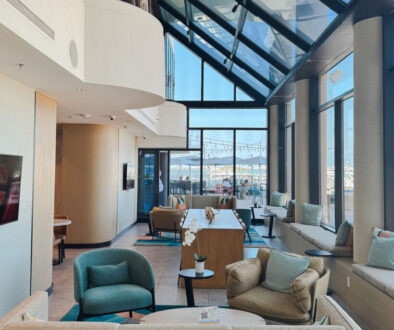Beyond the Hype: Strategic Marketing for Hotel Renovations
By Kimberly Erwin, Principal at Lotus Marketing | Hotel Marketing & Commercial Strategy
A hotel renovation is exciting – the promise of elevated guest experiences, modernized amenities, and a refreshed brand presence. However, the marketing strategy surrounding a renovation must go beyond just selling the dream of the future product. A one-dimensional approach that only showcases what’s coming can inadvertently create significant operational challenges, alienate guests, and negatively impact short and long-term revenue.
Balancing Vision with Reality
One of the most common pitfalls in hotel renovation marketing is focusing too heavily on the aspirational end result without considering the current guest experience. While it’s critical to build anticipation for the upgraded property, transparency with prospective guests is imperative. If a hotel prominently features an unachievable experience due to ongoing construction, it can lead to dissatisfaction, lower review scores, and eroded brand trust.
Marketers must strike a balance. Messaging should acknowledge the improvements while setting clear expectations about the guest experience during the renovation. Thoughtful communication, such as pre-arrival emails, website updates, and social media content, can help set the stage.
“During any renovation, hotels must balance the excitement for what is ahead with honesty about the guest experience at the time. Clear communication is always key—whether through pre-arrival emails, website updates, or staff training. By setting the right expectations at the Renaissance Chicago, we maintained guest trust and even turned some into repeat visitors eager to see the finished product.” Kristin Duncan, General Manager, Renaissance Chicago
Minimizing Guest Impact and Protecting Reviews
No guest wants to check into a construction zone. Noise disruptions, altered pathways, and closed amenities can significantly impact satisfaction. A well-rounded marketing strategy must include proactive measures to mitigate the impact of renovations on guests who are staying during the transition.
The sense of arrival is one of the most pivotal moments in shaping a guest’s perception of their stay. When a key public space, such as the lobby, is under construction, it is essential to have a strategic plan to mitigate any negative impact on the guest experience. One of the most innovative examples of this took place at the Renaissance Chicago Downtown during a major lobby renovation, which required guests to navigate fifty feet through a construction zone before reaching a temporary check-in desk on the second floor outside of a meeting room.
Rather than allowing the pathway to feel like an afterthought, the hotel transformed it into an immersive experience. Pipe and drape were used to darken the space, while ceiling-mounted interactive projectors created a dynamic visual journey, showcasing Chicago’s skyline, iconic landmarks, and cultural scenes as guests walked through. This thoughtful approach turned a potential pain point into an engaging and memorable moment. Remarkably, guest satisfaction scores at the Renaissance Chicago Downtown increased during the renovation period, demonstrating that strategic planning and creativity can turn disruption into a defining guest experience.
“The biggest challenge we had with that sense of arrival experience during the renovation wasn’t that guests were offended by it—instead, they were so engaged that they stopped to take selfies and video clips, which ended up jamming the walkway. And, an unexpected outcome is that it generated unexpected organic exposure on social media.” Adds Ms. Duncan.
Anticipating and addressing potential guest concerns before they arise is essential to maintaining satisfaction during a renovation. Every guest touchpoint on the property should be carefully considered, ensuring that disruptions are minimized and expectations are managed effectively. Some key tactics that should be considered essential during a renovation include:
- Welcome Letter from the General Manager – A personalized note that acknowledges the renovation, expresses appreciation for the guest’s patience, and outlines what the hotel is doing to enhance their stay. This should be warm, transparent, and solution-oriented, providing contact information for any guest concerns.
- Upgrading Guests to Higher Room Categories – Whenever possible, guests should be placed in rooms away from construction zones to minimize disruptions.
- Leveraging Loyalty Program Benefits – Offering bonus points, complimentary upgrades, or exclusive perks can help retain repeat guests and maintain goodwill.
- Surprise & Delight Upon Check-in – If the renovation is expected to be particularly disruptive, providing a thoughtful gesture can help offset potential frustrations. This could include an in-room amenity, an on-property credit, or another personalized touch to set the right expectations and proactively mitigate negative experiences.
In the case of the Renaissance Chicago, the renovation was tremendously invasive with much physical disruption – but perhaps more of a problem with the noise. Ms. Duncan shared, “We knew that noise could be a concern during the renovation, so we took a proactive approach to ensure a positive guest experience. Fortunately, our hotel brand is deeply connected to music, which gave us a unique opportunity to turn a potential disruption into a brand-aligned moment. Upon check-in, we provided all guests with complimentary branded earbuds to help minimize any inconvenience. For our VIP guests and prospective clients, we took it a step further by gifting them branded Beats headphones, reinforcing our commitment to their comfort while also creating a memorable touchpoint that resonated with our brand identity.”
These steps help preserve guest satisfaction and prevent a decline in review scores. In the age of digital transparency, a single frustrated guest’s online review about a disruptive stay can carry more weight than an entire marketing campaign promoting a future hotel product.
Revenue Mitigation Strategies for Disrupted Services
Beyond guest experience, revenue displacement is another critical concern during a renovation. Restaurants, spas, and event spaces are often impacted by construction, leading to lost income. Marketing should not only drive future bookings but also provide interim solutions to minimize financial losses.
Some strategies to counteract lost revenue include:
- Partnering with local restaurants or event venues to create exclusive offers for displaced guests
- Creating temporary pop-up dining or bar experiences
- Offering pre-renovation rates with added incentives to maintain occupancy
- Launching targeted promotions for alternative revenue sources, such as off-site catering or room service expansions
By proactively addressing displaced revenue streams, hotels can reduce financial strain while maintaining brand momentum.
A Holistic Approach to Renovation Marketing
Hotel renovations should be framed as an evolution, not a disruption. Successful marketing requires a dual approach: inspiring future guests with the upcoming transformation while protecting the current guest experience and maintaining revenue. Transparency, communication, and strategic planning will ensure that a renovation enhances the brand rather than causing short-term damage.
By considering all stakeholders—future guests, current guests, and revenue streams—hotels can successfully navigate the challenges of renovation marketing and emerge stronger, with a refreshed product and loyal customer base.




